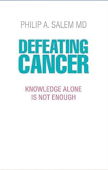There is a plethora of educational books for patients with cancer and their families; advocates and patients themselves write most. Books in this genre often have a difficult time distilling the hard science of oncology into a lay-friendly narrative that keeps the reader engaged from cover to cover. A refreshing new book, Defeating Cancer: Knowledge Alone Is Not Enough, accomplishes that and more, delicately guiding patients with cancer on their difficult journey through diagnosis, treatment, and beyond.
BOOKMARK

- Title: Defeating Cancer: Knowledge Alone Is Not Enough
- Author: Philip A. Salem, MD
- Publisher: Quartet Books
- Date: June 2018
- Price: $18.95, hardcover; 176 pages
The Power of Education
THE AUTHOR, Philip A. Salem, MD, is an oncologist, researcher, and international medical statesman who is an avid proponent of patient education, not the surface brand of information found in a glossy pamphlet in the oncology office, but a robust and deep understanding of cancer, and the art and science of defeating it. He writes, “I feel this book is the best gift I can give to any patient [with cancer] because I believe that the more the patient knows about his cancer and about its appropriate treatment, the better his chances for cure are.”
Honest Discussion Needed
THE BOOK is organized into two parts. In the first, Dr. Salem takes the patient with cancer through the continuum of care. Dr. Salem is not shy about using the “cure” word, and his optimism is stamped on every page. He also understands the holistic and spiritual nature of battling cancer. “Love is a powerful weapon in the fight against cancer. Along with hope, love gives us courage and makes us feel valuable and needed. Patients who feel they do not have love may feel all alone in the battle against cancer and may find it difficult to maintain hope.”
To his credit, Dr. Salem takes pains to explain staging, one of the more difficult clinical workups for many patients to grasp. He deftly sorts out the technologic differences and diagnostic capabilities between computed tomography scanning, magnetic resonance imaging (MRI), and positron-emission tomography, not an easy task. He does so in a way, however, that lay readers will get all of the necessary information without feeling overwhelmed.
Humanizing the Story
DR. SALEM shows his communication skills by adding beautifully drawn call-outs throughout the book, each a patient’s story. They are not feel-good essays sprinkled about to give a positive bounce to difficult issues; they are informative, simple, and thoughtfully written. For instance, Henry’s Story details a heavy smoker’s diagnosis of lung cancer. Henry originally sought medical attention for a severe headache. Instead he was referred to a medical oncologist who, after a battery of tests, determined that his newly detected cancer had spread outside of his right lung. Therefore, he had his lung removed in a long and complicated surgery, with the hope that the surgery would provide a cure or at least prolonged survival. Two weeks after the surgery, Henry went to see Dr. Salem, complaining that his headache had gotten progressively worse. Dr. Salem did something his prior doctors overlooked, a brain MRI, which showed metastatic brain cancer. This finding would have contraindicated the surgery to remove his lung. At the end Dr. Salem writes, “The point is: because an MRI of Henry’s brain was not done prior to surgery, staging of Henry’s cancer was not complete and he had a surgery that would not help him.” This was a tough clinical reality, usually not seen in books written for patients with cancer. Kudos to Dr. Salem.
The Big Picture: Health as a Human Right
THE SECOND SECTION is devoted to a poignant essay of medical practice and the right to health care, an issue the author is well versed on and passionate about. In the chapter dedicated to his argument that health is a human right, he turns back the pages of time to 1948, when the United Nations adopted the Universal Declaration of Human Rights. The proclamation declared that human rights are a common standard of achievement for all peoples and all nations.
Dr. Salem asserts that the Universal Declaration of Human Rights was one of the most “profound and substantive proclamations ever made by the [United Nations].” The main architect of the [Declaration] was the philosopher Dr. Charles Malik, who happens to have come from the same village in Lebanon as Dr. Salem. In fact, they worked together on political and health issues and became close friends.
And despite his utmost regard for Dr. Malik, the author is adamant that it is time for the United Nations to amend the Universal Declaration of Human Rights. “I believe there is an essential human right missing from the Declaration: the right to health,” asserts Dr. Salem. This is not a new proposal, but it remains controversial. In the United States, single-payer universal health care is one of the third rails in politics, as opponents are quick to link it to socialism.
“I believe that all other human rights pale in comparison to the right to health,” Dr. Salem writes. And to that end, he presents a concise rebuttal to opponents of declaring health a human right. His view not only uplifts our global humanity, it makes sense. Readers will close this little gem of a book better educated about the intricacies of the cancer care journey and, equally important feel nourished by a true global humanitarian and advocate for patients and their families.
Defeating Cancer is highly recommended for readers of The ASCO Post. ■

